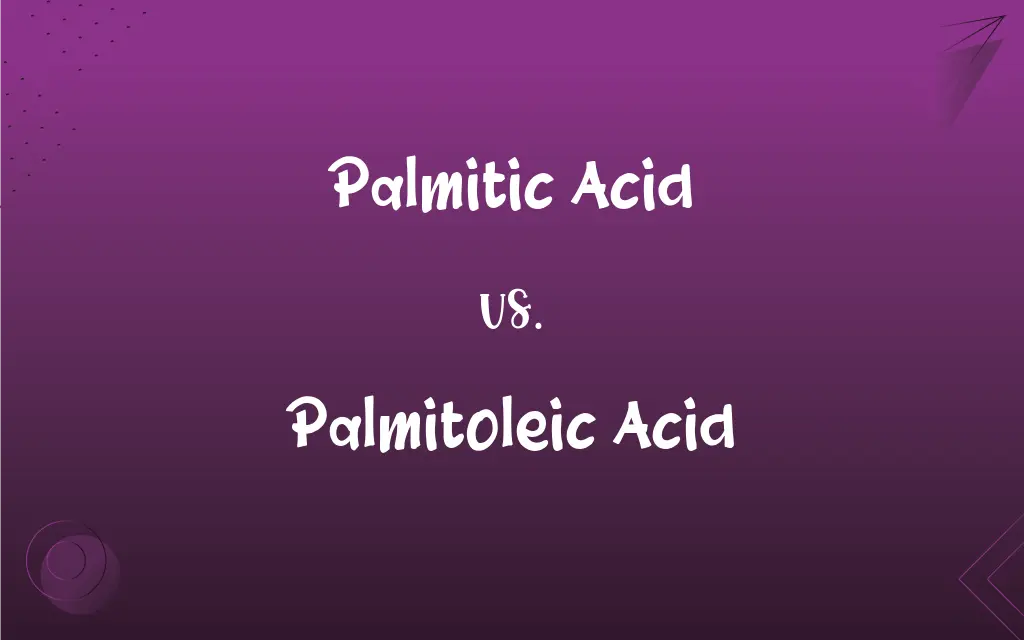Palmitic Acid vs. Palmitoleic Acid: What's the Difference?
Edited by Harlon Moss || By Janet White || Published on March 30, 2024
Palmitic acid is a saturated fatty acid found in animals and plants, while palmitoleic acid is a monounsaturated fatty acid mainly in animal fats and some plants.

Key Differences
Palmitic acid and palmitoleic acid are both fatty acids but differ significantly in their structure and properties. Palmitic acid is a saturated fatty acid, meaning it has no double bonds between its carbon atoms. This structural characteristic makes it solid at room temperature and commonly found in palm oil, dairy products, and meat. Palmitoleic acid, on the other hand, is a monounsaturated fatty acid, containing one double bond in its carbon chain. This single unsaturation point renders it more liquid at room temperature compared to palmitic acid.
The difference in the saturation level of palmitic acid and palmitoleic acid not only affects their physical state and dietary impact but also their role in human health. While palmitic acid is essential for various biological functions, its high intake is linked with increased risk of heart disease. Palmitoleic acid, conversely, has been associated with positive effects on insulin sensitivity and cholesterol levels, showcasing its potential protective effects against metabolic syndrome.
The sources of these two fatty acids highlight their dietary implications. Palmitic acid’s prevalence in saturated fat-rich foods requires mindful consumption, whereas palmitoleic acid’s presence in specific plant oils and fish suggests it may be a beneficial addition to the diet for its possible health-promoting effects. Understanding the balance and sources of these fatty acids can guide healthier dietary choices.
The role of palmitic acid in the environment and industry, due to its stability and availability, contrasts with the more niche but emerging interest in palmitoleic acid for its medicinal and health-related potential. The ongoing research into palmitoleic acid’s benefits underscores the evolving understanding of fatty acids beyond their basic nutritional value, indicating a complex interplay between diet, health, and disease.
Comparison Chart
Saturation
Saturated (no double bonds)
Monounsaturated (one double bond)
ADVERTISEMENT
State at Room Temperature
Solid
Liquid or semi-liquid
Common Sources
Palm oil, dairy, meat
Macadamia nuts, sea buckthorn oil
Health Implications
Associated with cardiovascular risk in excess
Beneficial for metabolism, anti-inflammatory
Role in Diet
Should be consumed in moderation
Considered beneficial, may improve insulin sensitivity
Palmitic Acid and Palmitoleic Acid Definitions
Palmitic Acid
A type of fat with no double bonds.
Palmitic acid is a major component of palm oil.
ADVERTISEMENT
Palmitoleic Acid
Linked with positive metabolic effects.
Incorporating palmitoleic acid into the diet can support metabolic health.
Palmitic Acid
Found widely in nature.
Dairy products are rich in palmitic acid.
Palmitoleic Acid
Found in select few plant and animal sources.
Sea buckthorn oil is a unique source of palmitoleic acid.
Palmitic Acid
When consumed in excess.
Excessive intake of palmitic acid can lead to heart issues.
Palmitoleic Acid
Contains one double bond.
Palmitoleic acid is found in high concentrations in macadamia nut oil.
Palmitic Acid
Beyond food, in cosmetics and soaps.
Palmitic acid is also used in the manufacture of soaps.
Palmitoleic Acid
Beneficial for health.
Palmitoleic acid may help reduce inflammation in the body.
Palmitic Acid
Characteristic physical property.
The palmitic acid remained solid on a cool day.
Palmitoleic Acid
Due to its unsaturated nature.
The palmitoleic acid stayed liquid even when it was cool inside.
FAQs
What is palmitic acid?
A saturated fatty acid found in various foods, solid at room temperature.
Where is palmitoleic acid found?
Mainly in macadamia nuts and sea buckthorn oil.
Where is palmitic acid found?
In palm oil, meats, and dairy products.
What is palmitoleic acid?
A monounsaturated fatty acid, liquid at room temperature, with health benefits.
Is palmitic acid bad for you?
In moderation, it's essential, but excess is harmful.
Is palmitic acid vegan?
Yes, though it's also found in animal products.
Can consuming palmitic acid affect health?
Yes, excessive intake is linked to cardiovascular disease.
Are there plant sources of palmitoleic acid?
Yes, including macadamia nuts and sea buckthorn oil.
How does palmitoleic acid affect metabolism?
It has potential metabolic benefits, including better insulin sensitivity.
Are there plant sources of palmitic acid?
Yes, such as palm oil and certain nuts.
How should I include palmitic acid in my diet?
Consume in moderation, considering its presence in saturated fats.
Does palmitic acid have industrial uses?
Yes, in cosmetics, soaps, and food products.
Does palmitoleic acid have any role in skin health?
Its anti-inflammatory properties may benefit skin health.
What are the benefits of palmitoleic acid?
It may improve insulin sensitivity and have anti-inflammatory effects.
Is palmitoleic acid vegan?
Yes, especially when derived from plant sources.
Are there supplements for palmitoleic acid?
Yes, available for those seeking its metabolic and anti-inflammatory benefits.
Is palmitoleic acid used in medicine?
It's being researched for its potential health benefits.
How can I add palmitoleic acid to my diet?
Through foods like macadamia nuts and supplements.
Can palmitic acid be converted to palmitoleic acid in the body?
No, they are metabolically distinct, though the body can synthesize both.
What role does palmitic acid play in food manufacturing?
It's used as a stabilizer, emulsifier, and to increase shelf life.
About Author
Written by
Janet WhiteJanet White has been an esteemed writer and blogger for Difference Wiki. Holding a Master's degree in Science and Medical Journalism from the prestigious Boston University, she has consistently demonstrated her expertise and passion for her field. When she's not immersed in her work, Janet relishes her time exercising, delving into a good book, and cherishing moments with friends and family.
Edited by
Harlon MossHarlon is a seasoned quality moderator and accomplished content writer for Difference Wiki. An alumnus of the prestigious University of California, he earned his degree in Computer Science. Leveraging his academic background, Harlon brings a meticulous and informed perspective to his work, ensuring content accuracy and excellence.































































